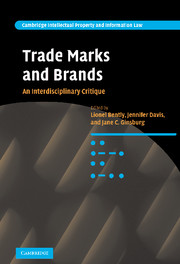Book contents
- Frontmatter
- Contents
- List of figures and tables
- Notes on the contributors
- Editors' preface
- Table of cases
- Table of statutes
- Part I Legal and economic history
- Part II Current positive law in the EU and the USA
- Part III Linguistics
- Part IV Marketing
- Part V Sociology
- Part VI Law and Economics
- 11 A Law-and-Economics perspective on trade marks
- 12 The economic rationale of trade marks: an economist's critique
- Part VII Philosophy
- Part VIII Anthropology
- Part IX Geography
- Bibliography
- Index
- Titles in the series
12 - The economic rationale of trade marks: an economist's critique
Published online by Cambridge University Press: 13 April 2010
- Frontmatter
- Contents
- List of figures and tables
- Notes on the contributors
- Editors' preface
- Table of cases
- Table of statutes
- Part I Legal and economic history
- Part II Current positive law in the EU and the USA
- Part III Linguistics
- Part IV Marketing
- Part V Sociology
- Part VI Law and Economics
- 11 A Law-and-Economics perspective on trade marks
- 12 The economic rationale of trade marks: an economist's critique
- Part VII Philosophy
- Part VIII Anthropology
- Part IX Geography
- Bibliography
- Index
- Titles in the series
Summary
Introduction
I found Andrew Griffiths' chapter a fascinating read. As an economist previously unfamiliar with the foundations of trade mark law, I was surprised to learn of the dominant influence of ‘Law-and-Economics’. One reason for my surprise is that Law-and-Economics rests on a very particular approach to economics, one arguably not shared by the majority of economists. Law-and-Economics rests on what might be loosely termed ‘Chicago economics’, which overlaps heavily, but does not coincide, with orthodox neo-classical economics. Thus Griffiths' tendency throughout to refer to the foundations of Law-and-Economics as ‘neo-classical’ economics is rather misleading. This is not the place to describe the distinctive features of Chicago economics in detail; I offer one here as an illustration. Chicago economics, and so Law-and-Economics, assumes that individuals are self-interested, in a narrow sense: individuals always maximize their own personal material benefit. Law-and-Economics, then, is the world of that caricature, homo economicus. I will return to exactly why it is a caricature later. In contrast, while neo-classical economics is well known for positing ‘utility maximizing’ agents, utility is defined in entirely formal terms as the numerical representation of individual preferences. Hence ‘utility maximization’ becomes merely ‘maximization of preference satisfaction’, or, more prosaically, ‘doing what you want to do’. And if your preferences are best described as ‘self-sacrificing’ rather than ‘self-interested’, then so be it: ‘The postulate that an agent is characterised by preferences rules out neither the saint nor Genghis Khan.’
- Type
- Chapter
- Information
- Trade Marks and BrandsAn Interdisciplinary Critique, pp. 267 - 282Publisher: Cambridge University PressPrint publication year: 2008
- 2
- Cited by



